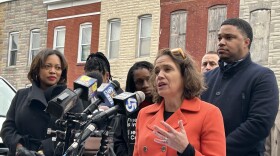After delaying a decision for two weeks, the Board of Estimates approved fixed pricing Wednesday.
The new policy allows the Department of Housing and Community Development (DHCD), to sell city-owned vacant lots and houses — in the most distressed neighborhoods — for as little as $1 to individuals and community land trusts. Developers and large non-profits would pay $3,000 while small non-profits could pay $500-$1,000.
Alice Kennedy, the housing commissioner, said the policy creates a transparent pricing structure and reduces wait times. Buyers can purchase up to 12 properties and must have a minimum of $90,000 to renovate. She added that DHCD will work with residents so they are financially prepared to purchase the vacant houses.
City Council President Nick Mosby is the only member of the five board panel who voted no. “This is a really bad policy,” he said. “It's a bad policy because it doesn't protect or prioritize the rights of the folks in these communities. It only provides an added advantage for the folks that have become subject-matter experts in procuring property.”
According to the DHCD dashboard, there are over 13,000 vacant properties in Baltimore, with a few hundred belonging to the City. In the meeting, two housing advocates testified about the policy; one in support while the other in opposition.
Nneka N’namdi, head of the Stop Oppressive Seizures (SOS) Fund, said she was in favor as long as “administrative policies ensuring equity would be implemented.”
They include:
- Technical assistance for current residents attempting property rehab.
- A right of first refusal for those beautifying vacant lots; &
- Allowing affordable housing, multi-generational living arrangements, and mixed-income development.
“Most importantly,” N’namdi said, “speculators and slumlords need to be barred from participating in this program.”
Click here to see which properties are available.









